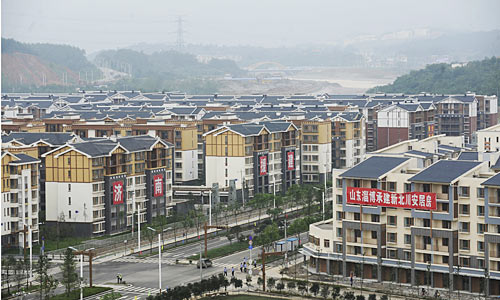|
 |
|
A COUNTY'S REBIRTH: Construction of a new county seat in Beichuan, southwest China's Sichuan Province is completed on September 25, almost two and a half years after the old seat was leveled in a devastating earthquake in 2008 (JIANG HONGJING) |
Quick Response
Earthquakes in recent years have prompted the Chinese Government to draw up a series of goals for rapid response and more efficient monitoring work, a government document indicated on September 25.
According to the document issued by the State Council, China's cabinet, one goal by the year 2015 is to have search and rescue teams able to reach quake zones in less than two hours.
Meanwhile, basic living standards of the people in disaster-hit regions will be ensured within 24 hours of an earthquake.
According to the document, China aims to monitor earthquakes at and above 2.0-magnitude in crowded and developed areas. In the rest of the country, quakes that measure at and above 3.0-magnitude will be monitored.
Closer Banking
Bank of Communications (BOCOM), China's fifth largest lender by assets, announced on September 24 that it had established a representative office in Taiwan, the first such office set up by a bank from the Chinese mainland.
A BOCOM spokesperson said the move will help strengthen information exchanges between financial institutions and consumers across the Taiwan Straits, pushing forward economic and financial cooperation.
The announcement came one day after the applications of BOCOM and Bank of China to set up representative offices in Taiwan were approved by Taiwan's top financial regulator on September 23.
Taiwan's "Financial Supervisory Commission" said the two banks from the Chinese mainland would be first authorized for non-profit business activities such as "liaising with banks and consumers and collecting financial market information in Taiwan" for a year before being able to apply to set up branches.
Additives Dumping
China's Ministry of Commerce (MOC) announced on September 21 that it will impose five-year anti-dumping measures on food additives imported from Indonesia and Thailand.
Investigations found companies in Indonesia and Thailand had been dumping food additives on the Chinese market, causing substantial damage to Chinese manufacturers, said a statement on the website of the MOC.
The final ruling required importers of disodium 5'-inosinate, disodium 5'-guanylate and disodium 5'-ribonucleotide to pay anti-dumping tariffs starting September 24, the MOC said.
The statement also listed new tariff rates for products imported from the two Indonesian companies, PT. Cheil Jedang Indonesia and PT. Kirin Miwon Foods, at 6.3 percent and 6.9 percent, respectively, and a 4.8-percent rate for the Ajinomoto Co. (Thailand) Ltd.
Going Digital
China has rolled out a blueprint to boost the nation's digital publication industry. The blueprint, issued by the General Administration of Press and Publication, sets out the goal for all publishers to offer digital publications to the market by 2020.
The blueprint outlined that by the end of 2015 the revenue generated by digital publications should represent one fourth of the total revenue of the publication industry.
Further, also within this timeframe, China will build eight to 10 national industrial parks for digital publications, and each of the industrial parks should generate a revenue of more than 10 billion yuan ($1.49 billion).
Additionally, the blueprint projects there will be around 20 major digital publication enterprises by the end of 2015, each of which will generate an annual turnover of more than 1 billion yuan ($149.3 million).
China will provide favorable policies to competitive publication enterprises, including granting them Internet copyrights at the earliest time, according to the blueprint. | 